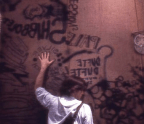
Depending who you ask, Rimini will have varying connotations. For cinephiles, the Adriatic city is Fellini’s birthplace, a (reconstructed) setting in his films à clef I Vitelloni (1953) and Amarcord (1973). For Germans and Austrians of the boomer generation, a summer vacation in Rimini used to represent the epitome of la dolce vita, drawing them in such numbers that the beaches earned the charming nickname “Teutonic grill.” Whereas for snobbish Italians like myself, who have never set foot there, the place is associated with tacky holidays and hellish images of a vast coastline swarming with sunbathers.
Rimini plays with all of the above, though, of course, this being an Ulrich Seidl film, in perverted form. Instead of Amarcord’s adorable grandpa, lost in a fairytale mist on his way home, there’s Richie Bravo (Michael Thomas)—greasy peroxided hair, face bloated by alcohol, beer gut bulging out of a sealskin coat so mangy it looks like it smells of an actual seal—who tramps through the relentless fog, attending to a succession of dreary errands. It’s winter and not a single umbrella or deckchair stands on the beaches that Wolfgang Thaler, Seidl’s longtime DP, captures in wide shots of desolate beauty. As Richie keeps crossing from one edge of the frame to the other, evoking a biblical character left to wander in the desert, the only people he passes are African refugees, huddled together and silently enduring the cold and the wind while waiting for nothing in particular—a dismal sight that has become all too familiar in northern Italy over the last decade.
Everything in the film gestures towards a past heyday. Richie is a singer of Schlager, a genre of treacly love ballads that is hugely popular in German-speaking countries. Judging by his “villa,” tawdry décor notwithstanding, he must have once enjoyed a lucrative career. Now he’s reduced to singing his old hits to groups






